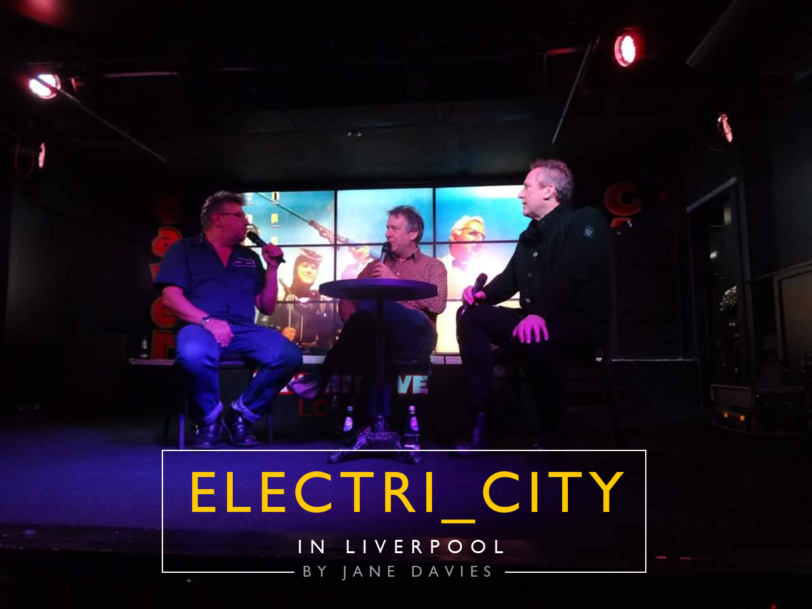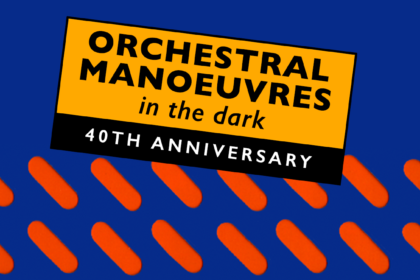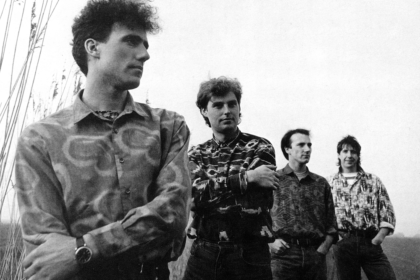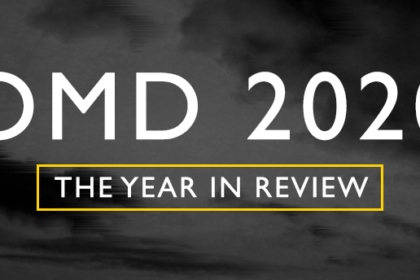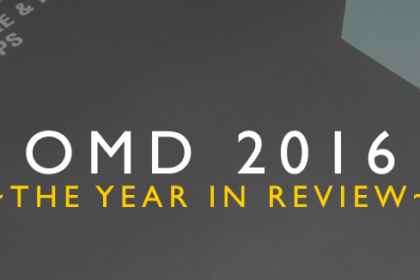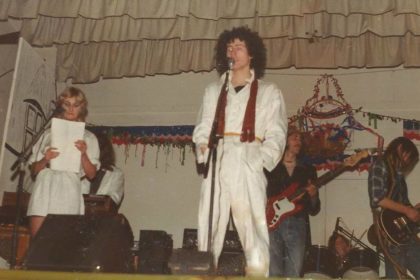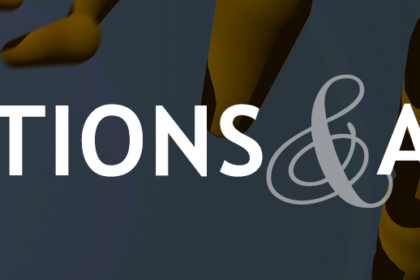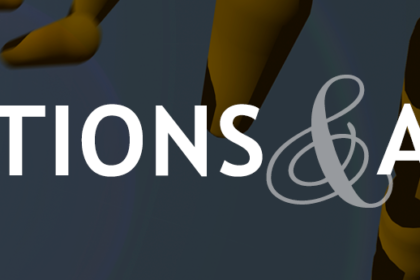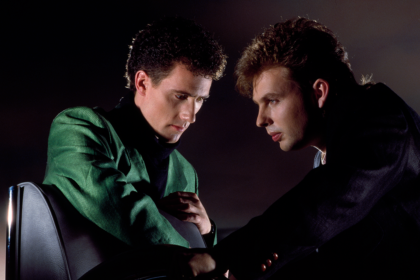The Düsseldorf connection
With the launch of Electri_City: The Düsseldorf School of Electronic Music , author Rudi Esch has been busy promoting the publication and arrived in Liverpool this month to chat to Andy McCluskey about the book, Düsseldorf’s musical legacy and electronic music in general…
Liverpool welcomed the Electri_City book promotional tour this week. It was only fitting that the launch be held in the Cavern Club, with the birthplace of popular music playing host to a celebration of electronic music.
We were treated to a whistle-stop aural history of the Düsseldorf electronic music scene 1970 to 1986 by author and Die Krupps bassist, Rudi Esch. Rudi has charted the rise of local bands Kraftwerk, Neu!, La Düsseldorf and also documented the perspectives of the UK electronic bands inspired by them in a series of interviews.
The evening’s proceedings were interspersed with images and music from La Düsseldorf and Kraftwerk which were in direct competition at times with The Beatles music emanating from the bar next door – much to the amusement of special guest Andy McCluskey from OMD, who was once quoted as saying it was not The Beatles that were the most influential group in history, but Kraftwerk, as their music has influenced – and continues to influence – generations of musicians.
Against a heavily industrialised city backdrop, famous for its fashion and arts scene, a new musical movement was born in the 1960s and 1970s, striving to ignore the American and English rock clichés of the era, giving rise to a futuristic sound pioneered by bands such as Kraftwerk, Neu La Dusseldorf.
Kraftwerk were in a fortunate position to access the first wave of synthesisers and Wolfgang Flür was the first person to build and play an electronic drum machine in 1974.

The panel discussed the influential work of Conny Plank, the understated sound engineer who launched Kraftwerk’s career and played a major part early on in the development of German music and is accredited with Ultravox’s masterpiece, ‘Vienna’. By day in the studio he would work on classical music, but by night he would invite in hippy friends from Neu! or Kraftwerk to use the equipment. Plank went on to work with Brian Eno and the Eurythmics.
It had been an ambition of his to work with Bowie and Kraftwerk but alas this never materialised. Bowie’s ‘Heroes’ later went on to be a Krautrock defining moment. Bowie gave his seal of approval to German music when he played Trans-Europe Express before taking to the stage on tour. The Radio-Activity album was played in full before going onstage at Düsseldorf on tour.
The panel concluded that the Germans did not try to do their own version of rock music, but that they found their own alternative music. Surprisingly Kraftwerk broke into the United States, playing up to German stereotypes – and the Americans loved the suits and sensible haircuts.
The second part of the evening featured Andy McCluskey’s electronic music journey from 1975 to the present day. In 1975, Andy McCluskey was searching for new music, radically different to the prog rock favoured by his friends. He bought the Autobahn album and attended his first Kraftwerk gig in the same year, which was to start a series a life changing events. Contrary to what was documented in Wolfgang’s Flür’s book, he did not meet the band on that evening, but actually much later in Bochum when performing with OMD.
Probe Records in Liverpool provided a source for more German music and he found Neu!, which had a rock and more organic feel which he favoured. Andy shared his interest of electronic music with friend Paul Humphreys and subsequently inspired to make their own electronic music. The prohibitive cost of instruments resulted in homemade efforts starting with a noise machine with no keyboard crafted by electronics enthusiast Paul. A bass guitar was followed eventually by a Selmer Pianotron , Vox organ and then their first keyboard bought on hire purchase.
For two years they slaved away establishing their musical identity before they felt confident enough to perform live at Eric’s Club in October 1978. It was ‘Electricity’, first known as ‘Pulsar Energy’, a self-confessed speeded-up punk version of ‘Radioactivity’ that gave them their first break with the Factory Label.
Upon being asked about his opinion now of his early work, Andy looks back with affection whilst at the time, he felt that they sounded rather amateur and the timings were all wrong. He recalled dying a stage death at the Manchester Apollo in support to Gary Numan when they had forgotten to wind back Winston the tape player to the correct place.
Kraftwerk themselves had suffered mechanical breakdown at their 1981 Düsseldorf gig. DAF had a battery of 20 tapes for each song that they performed live and had to rewind for the encores. Precision came in as technology improved.
BUY NOW
Ralph Hütter wanted a mechanical feel to Kraftwerk, but couldn’t do it as instruments had to be played by hand. Andy felt that when Ralph Hütter got rid of the human element, Kraftwerk lost a lot and became too rigid and it lost its humanity.
Looking forward, the third Electri_City conference will be held in October 2017 with more of a focus on the current electronic music scene. Andy shared his defining moment of the 2015 conference, which was when he got to see Michael Rother live, and ‘Karussell’ was played, and was later taken to the Kling Klang studio.
Rudi observed that the current young music scene in Düsseldorf is still styled in the electronic tradition of Kraftwerk and Neu. For Andy, like any other electronic music enthusiast, he got into electronic music as he wanted to listen to music that pushed boundaries and broke the mould. He observed that nowadays the young have a nostalgia of the future, preferring analogue instruments to digital and their reaction to him using soft synth plugins is that of sheer disbelief and horror. He described making music with analogue equipment as being just as retro as folk music.
When asked how Andy views the future of electronic music, he said that bands should reference the past, but develop their own sound and not strive to copy what has gone before. Andy gave a quick update on the progress of the forthcoming OMD album, The Punishment of Luxury, due for release next year and touring. He reported that progress was slow, and that after writing songs for nearly 40 years it was becoming difficult to find something new to write about.
Die Krupps are currently touring Japan and Rudi will continue on his two year sabbatical to promote the Electri_City book and conferences. In conclusion the panel agreed that the book was amazing and has made Düsseldorf finally realise and acknowledge their musical history. Andy commented that it would be inconceivable for Liverpool to not celebrate the Beatles, but that Dusseldorf, until the publication of the book did not fully grasp their huge global music legacy. He wasn’t entirely sure however if he would ever be sat in a bar in Düsseldorf listening to Kraftwerk played on acoustic guitar…

